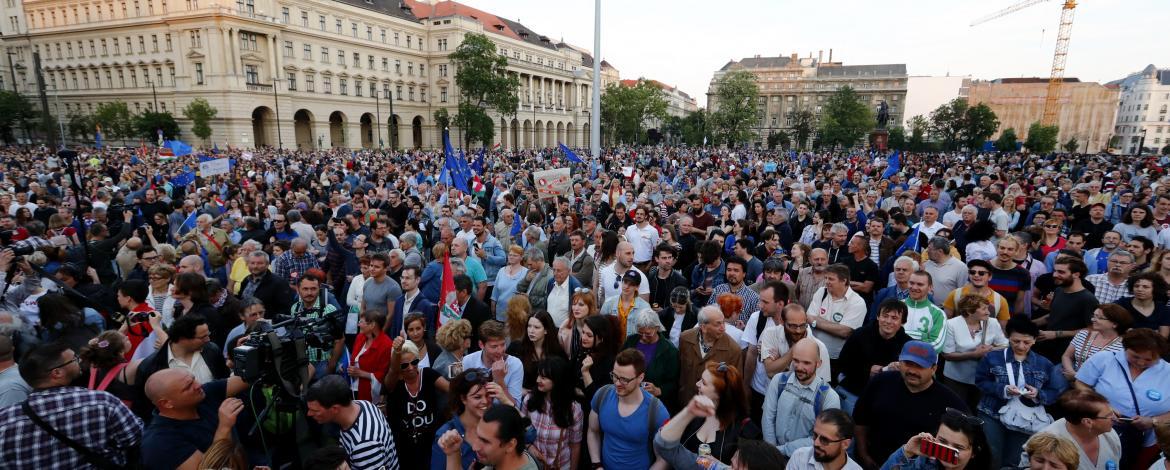Draft General Comment on the Right of Peaceful Assembly
Published on 08 Jul 2019, 04:19 PM
The Human Rights Committee started the first reading of the draft General Comment during its 126th session in July 2019
 Photo credit: Reporters without borders
Photo credit: Reporters without borders
On Thursday 11 July 2019, the Human Rights Committee started the first reading of the Draft General Comment on Article 21 (Right of Peaceful Assembly) of the International Covenant on Civil and Political Rights. The discussions continued on Tuesday 16 and 23 July, and Friday 26 July. The discussions were public and are available here, here, here and here.
Article 21 of the International Covenant on Civil and Political Rights establishes that:
'The right of peaceful assembly shall be recognized. No restrictions may be placed on the exercise of this right other than those imposed in conformity with the law and which are necessary in a democratic society in the interests of national security or public safety, public order (ordre public), the protection of public health or morals or the protection of the rights and freedoms of others.'
"In many cases, the human rights project has really been taken forward through the use of peaceful assembly. It has become clear that it is a tool for those who do not have other forms of power."
- Christof Heyns, Rapporteur of the General Comment, on the reason why the Committee chose article 21
Draft Available
The draft General Comment is available in English, French and Spanish and it considers input from 43 different actors. It provides relevant considerations on the extent of the right of peaceful assembly and the requirements to restrict this right. During the 126th sessions, the Committee discussed the structure of the draft and paragraphs 1 to 34.
During the discussions, several members pointed out that assemblies are not only used to air grievances: they also show solidarity, set aspirational goals and celebrate diversity. These events enable society to strengthen their cohesion, and have positive purposes: to generate ideas and shape public debates. The Committee stressed that everyone has the right to peaceful assembly, including children, foreign nationals and stateless persons.
Moreover, members stressed that the right to peaceful assembly is recognized in regional mechanisms and in most domestic legal systems, which makes it important to stress the universality of this right. Some members made comments regarding the footnotes and the fact that they should not be limited to their own Concluding Observations and the European Court of Human Rights.
Regarding some topics, the Committee had difficulties to reach a consensus. These included online assemblies, or assemblies that are made possible thanks to modern technologies, and one person pickets. This last issue had to do with the definition of an assembly, which in the draft is limited to a gathering of more than one person. Another issue that was discussed but not decided yet, was whether assemblies are only protected if they take place in a publicly accessible space. Some of these issues were put in square brackets, to come back to them at a later stage.
New technologies are regarded by the Rapporteur as one of the main challenges of this General Comment. He explained not to have taken a firm position regarding online assemblies in the draft, since online assemblies might not need as much protection as assemblies in real life. He warned against unwanted effects of awarding online assemblies the same protection as other assemblies, since States might start considering the former as an alternative to the latter.
Lastly, it was stressed that article 21 should not be seen in isolation. It is linked to freedom of expression, but also to a broad range of other rights, including the right to life, the prohibition of ill-treatment, the prohibition of arbitrary detention, the freedom of religion, the freedom of movement and the right to privacy, as has already been confirmed in the Committee’s jurisprudence.
Next Steps
Upon conclusion of the first reading of the Draft General Comment, stakeholders including Member States, will be invited to provide their comments. It is hoped that the first reading can be completed in November 2019, and that the general comment will be adopted at the end of 2020.
 Photo credit: Reporters without borders
Photo credit: Reporters without borders

